The Submittal V2 Maintenance screen can be accessed through the Settings icon (![]() ) or directly via URL (../construct-pm/submittalsv2/maintenance).
) or directly via URL (../construct-pm/submittalsv2/maintenance).
NOTE: The privilege 'SubmittalsV2 – Submittals Admin' is required to access and update this screen. For more information, please refer to Construct PM - Security.
NOTE: The Submittals V2 Maintenance screen will be released in Patch V12-21.
General Settings
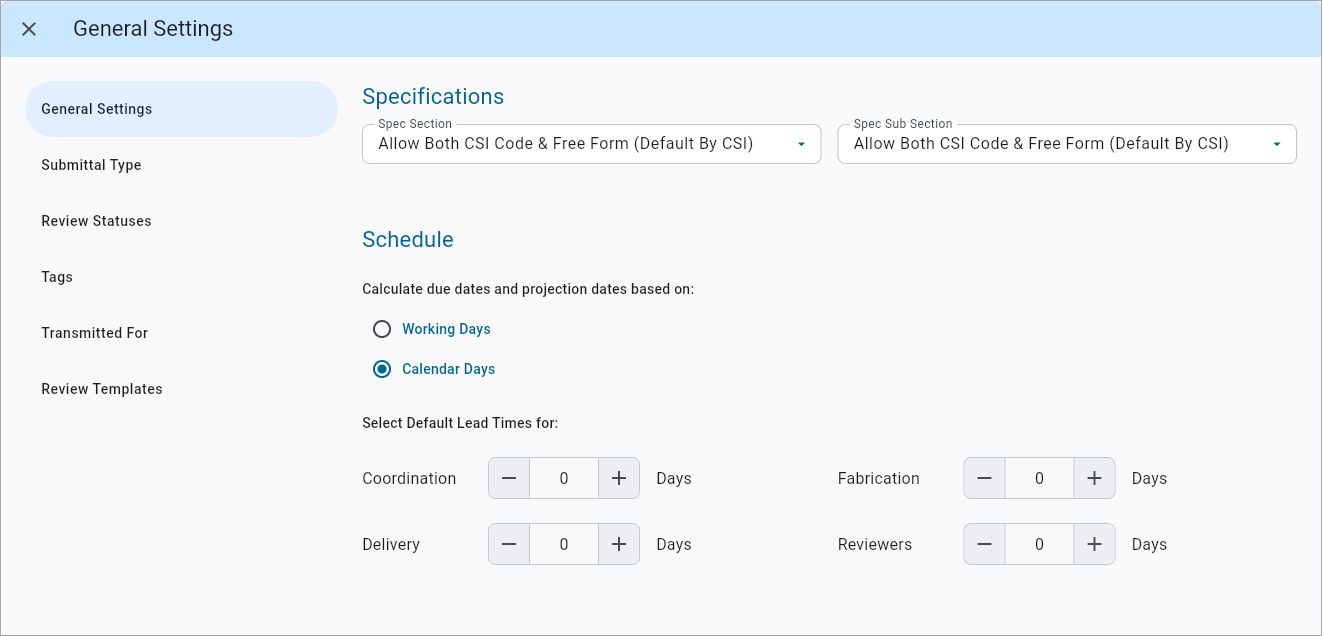
General Settings launched from Submittals V2 log screen
The General Settings screen allows users to set controls for the LOV options for the specification fields in Submittal records and set schedule options for due dates and projection dates.
Specifications
Spec Section, Spec Sub Section
Select one of the following options for the Spec Station/Spec Sub Section fields on the Submittals V2 Details tab:
-
Allow Only CSI Codes: Users will be able to select from an LOV of existing CSI codes.
-
Allow Only Free Form: Users will be able to enter a free-form value.
-
Allow Both CSI Code & Free Form (Default by Free Form): Users will be able to enter a free-form value.
-
Allow Both CSI Code & Free Form (Default by CSI): Users will be able to select from an LOV of existing values.
CSI codes are maintained in the CSI Code Maintenance screen (standard Treeview path: CMiC Field > File Maintenance > Local Tables > CSI Code Maintenance). For more information, please refer to CMiC Field - CSI Code Maintenance.
Schedule
Calculate due dates and projection dates based on – Radio Buttons
Select whether to calculate due dates and projection dates based on working days or calendar days. This determines the default for new submittals.
Select Default Lead Times for
Select the default lead times (in days) for the coordination, fabrication, delivery, and reviewers.
Submittal Type
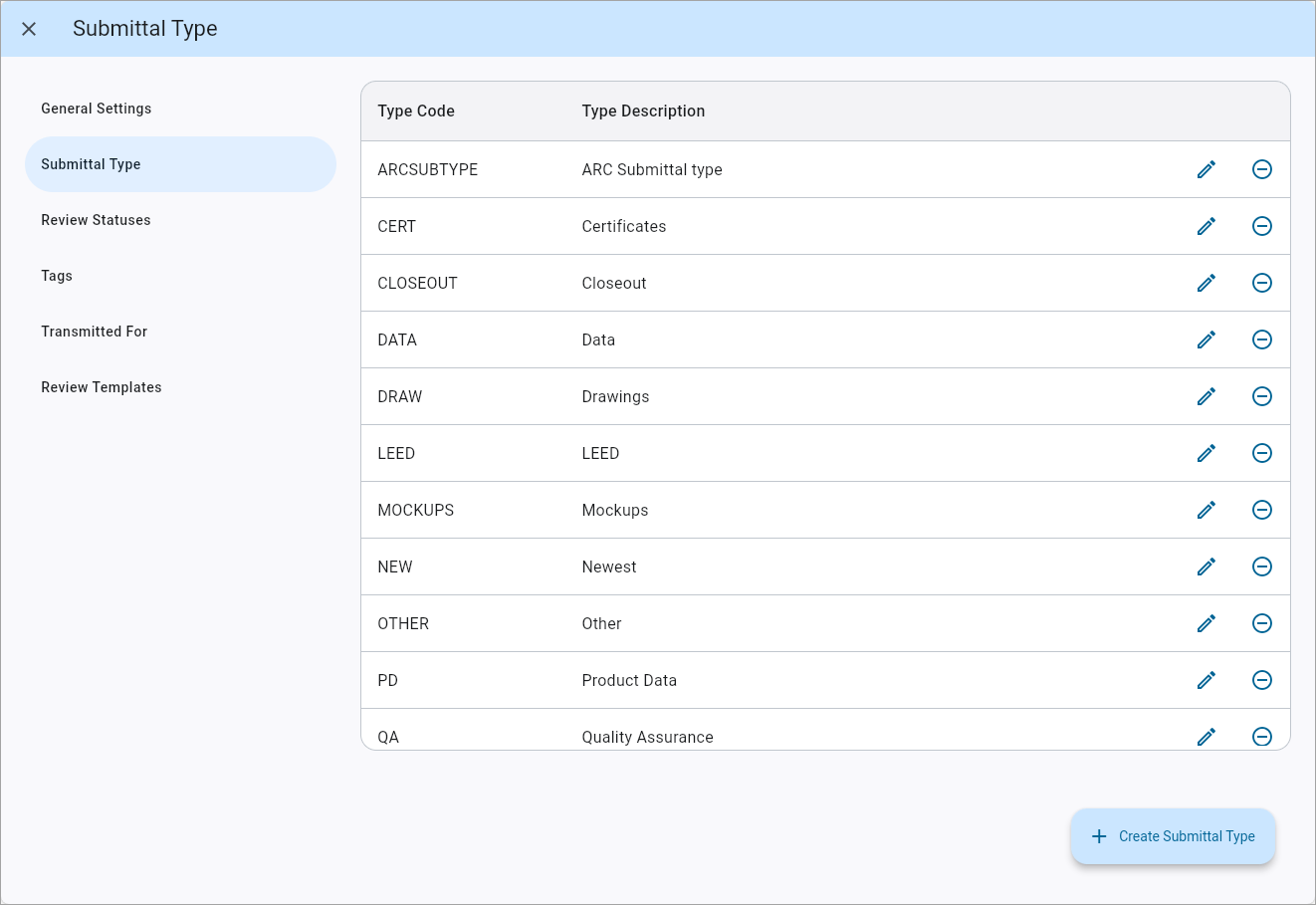
Submittal Type screen
This screen is used to add, edit, or delete submittal types. Submittal types are shared with the classic Submittal screen and are maintained in the Submittal Type Maintenance screen in CMiC Field (standard Treeview path: CMiC Field > File Maintenance > Local Tables > Submittal Type). For more information, please refer to CMiC Field - Submittal Type.
Once a submittal type has been created, the code cannot be modified but the description can be changed. Press the Edit icon (![]() ) to modify an existing item. Press the Delete icon (
) to modify an existing item. Press the Delete icon (![]() ) to delete an existing item.
) to delete an existing item.
[Create Submittal Type] – Button
Press this button to launch the Create Submittal Type pop-up. Enter a code and description for the submittal type and press [Okay].
Review Statuses
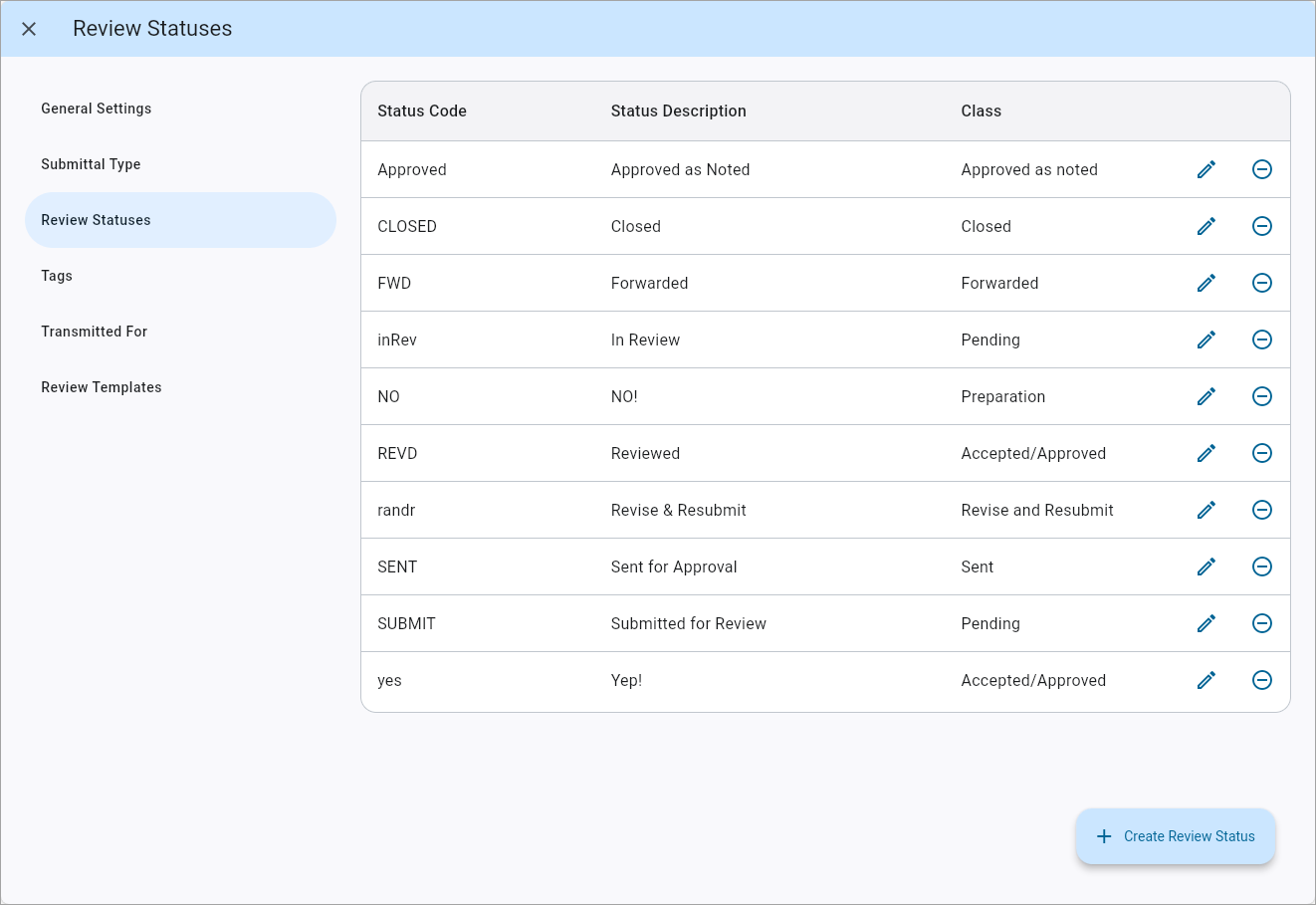
Review Statuses screen
This screen is used to add, edit, or delete existing review response statuses.
Once a review response status has been created, the code cannot be modified but the description, class, and project roles can be changed. Press the Edit icon (![]() ) to modify an existing item. Press the Delete icon (
) to modify an existing item. Press the Delete icon (![]() ) to delete an existing item.
) to delete an existing item.
Press the Edit icon (![]() ) to modify an existing item. Press the Delete icon (
) to modify an existing item. Press the Delete icon (![]() ) to delete an existing item.
) to delete an existing item.
[Create Review Status] – Button
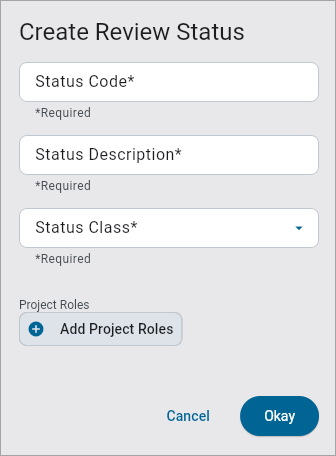
Create Review Status pop-up
Press this button to launch the Create Review Status pop-up.
Status Code
Enter a unique status code.
Status Description
Enter a description for the review status code. This value is displayed in (Undefined variable: ProductNameSet.Prod_Name_PM) and reports.
Status Class
Select a review status class. This determines the functional effects when a review response status is provided by a reviewer. The following status classes are available in the LOV:
-
Preparation: A non-committal response that indicates that materials or information are being gathered. This class does not progress the review process.
-
Pending: A non-committal response that indicates the reviewer has examined the submittal but has yet to provide their official response. This class does not progress the review process. This class is applied automatically for reviewers when inserting additional “Guest Reviewers”.
-
Sent: A response that indicates information and/or materials have been provided. This class is typically applied by the submitter at the start of the review process.
-
Forwarded: A response that indicates contents have been verified and passed on to the next reviewer.
-
Received: A response that indicates acknowledgment of receipt.
-
Revise and Resubmit: A response that triggers the creation of a new review cycle and sends the BIC back to the primary submitter on the record.
-
Approved as noted: A positive response with qualifications. This class moves the review to the next step while noting limiting criteria or constraints.
-
Accepted/Approved: A positive response. This class moves the review to the next step.
-
Closed: A response that closes the submittal record as a whole.
[Add Project Roles] – Button
Press this button to add project roles to the review status. This determines which users can apply a review status. If no roles are assigned, the review status will be unrestricted and all users will be able to apply it as a review response. If one or more project roles are added, the review status will be restricted to users that have one of the assigned project roles.
Tags
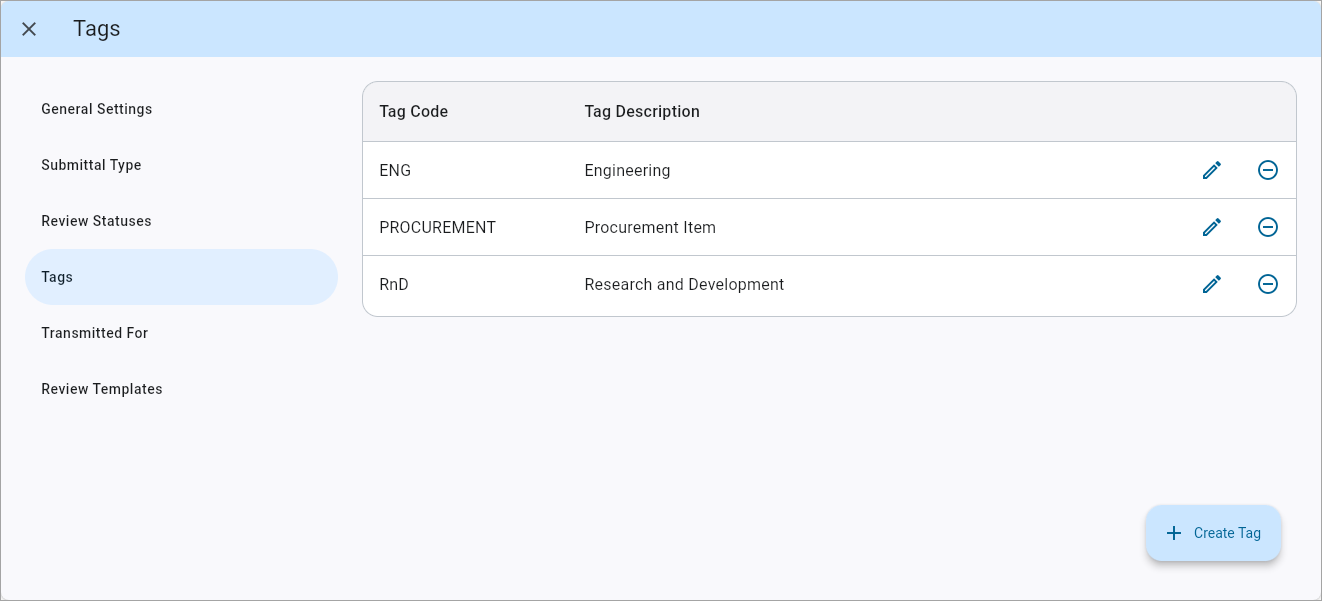
Tags screen
This screen is used to add, edit, or delete submittal tags available for selection in the Submittals V2 Details tab.
Tags are a flexible and customizable way of classifying Submittal records. They can be used to support “Packaging”, categorizing by discipline, tracking procurement items, and other types of grouping not already captured by the standard fields in Submittal records.
The
Once a tag has been created, the code cannot be modified but the description can be changed. Press the Edit icon (![]() ) to modify an existing item. Press the Delete icon (
) to modify an existing item. Press the Delete icon (![]() ) to delete an existing item.
) to delete an existing item.
[Create Tag] – Button
Press this button to launch the Create Tag pop-up. Enter a tag code and description and press [Okay].
Transmitted For
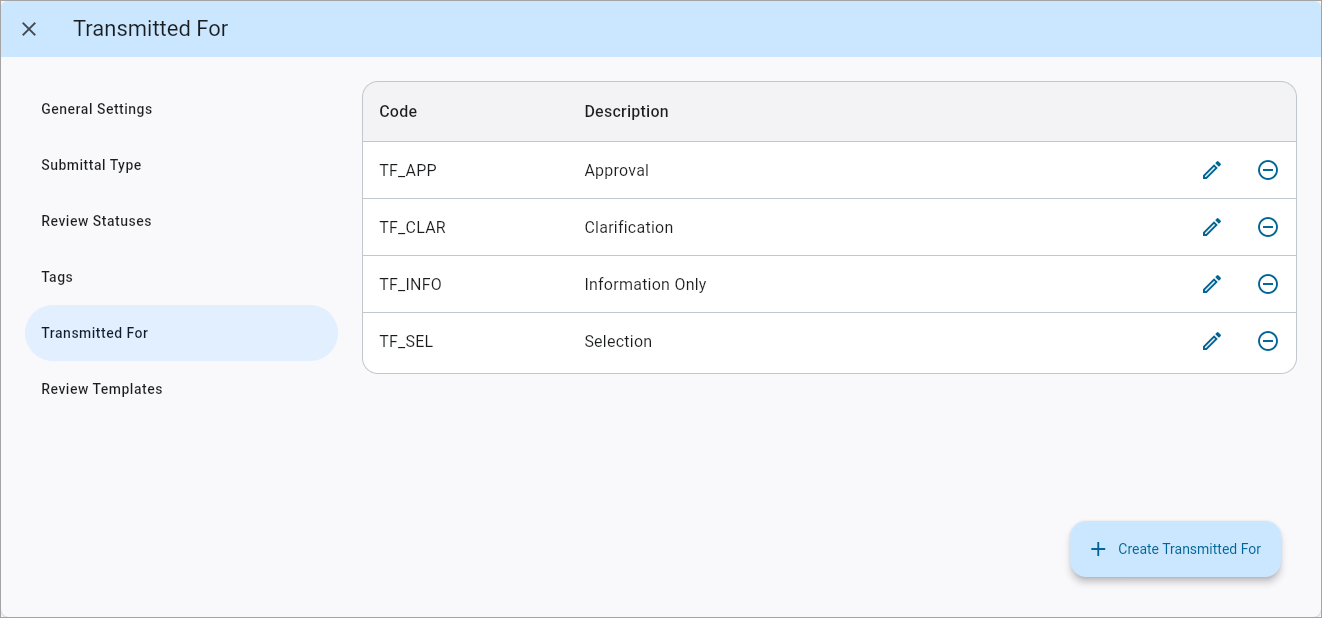
Transmitted For screen
This screen is used to add, edit, or delete options in the LOV of the Transmitted For field of the Submittals V2 Details tab.
Once a transmitted for option has been created, the code cannot be modified but the description can be changed. Press the Edit icon (![]() ) to modify an existing item. Press the Delete icon (
) to modify an existing item. Press the Delete icon (![]() ) to delete an existing item.
) to delete an existing item.
[Create Transmitted For] – Button
Press this button to launch the Create Transmitted For pop-up. Enter a code and description and press [Okay].
Review Templates
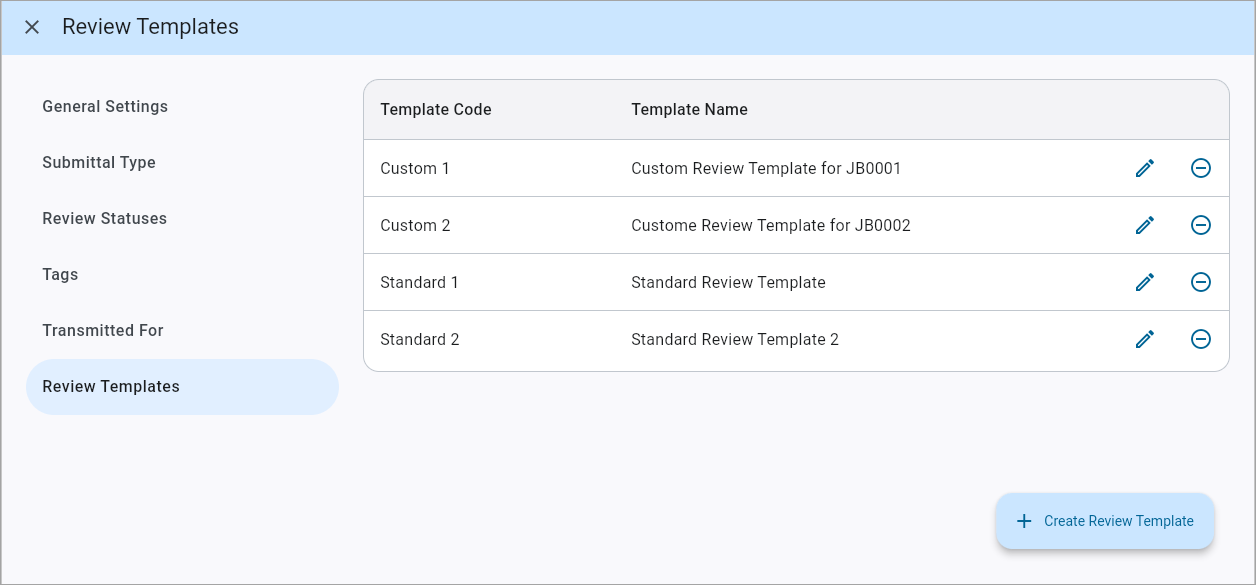
Review Templates screen
This screen is used to add, edit, or delete standard review workflow templates available in the Submittals V2 Review tab.
NOTE: Users require the project role privilege 'Maintain Review Workflows- SubmittalsV2' to maintain templates in this screen. For more information, please refer to Construct PM - Security.
Once a review template has been created, the code cannot be modified but the description can be changed. Press the Edit icon (![]() ) to modify an existing item. Press the Delete icon (
) to modify an existing item. Press the Delete icon (![]() ) to delete an existing item.
) to delete an existing item.
[Create Review Template] – Button
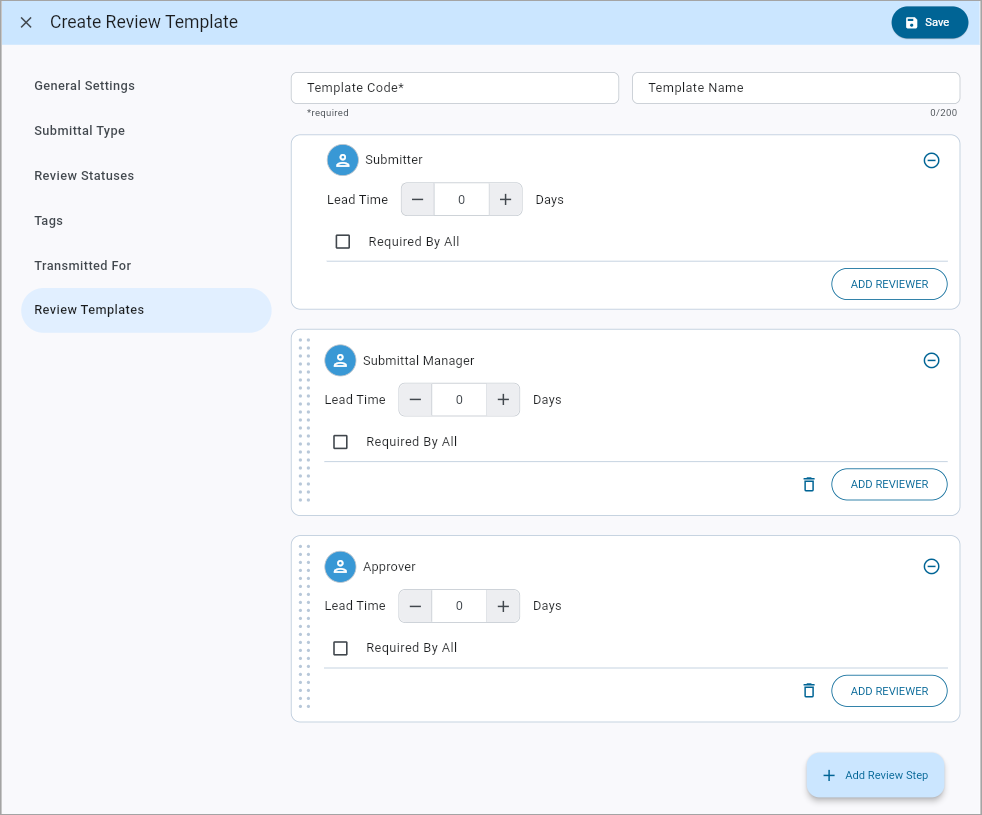
Press this button to launch the Create Review Template screen. By default, the first review step will be the submitter from the record header. Additional review steps can be added by pressing the [Add Review Step] button at the bottom of the screen.
Template Code, Template Name
Enter a template code and name.
Review Step
Lead Time
Select a value in the Lead Time field to indicate the expected turnaround time for the reviewer(s) at that step. The due date for each receiver will be based on the received date (i.e., when the previous step was completed) plus the lead time. This means that all reviewers included in the same review step will have the same required due date.
Required By All – Checkbox
If more than one reviewer is added to a step, the 'Required By All' box will determine the criteria for moving to the next review step.
If checked, the review workflow will not move to the next review step until a review response has been provided by each of the reviewers included in the current review step. This can be used to support parallel review workflows with multiple contacts/entities reviewing simultaneously.
If unchecked, the first review response received will complete the review step and advance the workflow to the next step. This allows for a flexible review processes where a review response is required but it can be provided by any one from a set of contacts/entities.
Add Reviewer
Press the [Add Reviewer] button to select one or more reviewers. Users can choose from the following options:
Contacts: Any contact on the project. List: Any distribution set up on the project. Distribution lists are maintained in the Distribution Lists screen in CMiC Field (standard Treeview path: CMiC Field > Communication Management > Distribution Lists. For the purposes of the review workflow, the list is considered as one reviewer. When a distribution list is a BIC-reviewer, any of the included contacts may provide a response on behalf of the list. Company: Any company (i.e., project partner) on the project. When a company/partner is a BIC-reviewer, any contact registered under that company that has the 'Respond on behalf of Business Partner' privilege assigned may provide a review response. Keyword: These variables pull from the corresponding fields in the Submittal record header, inserting the contacts/ list/ company found there into the review workflow. This allows for a single template to be used for a variety of submittals with different parties, as long as the review workflow follows the same structure.